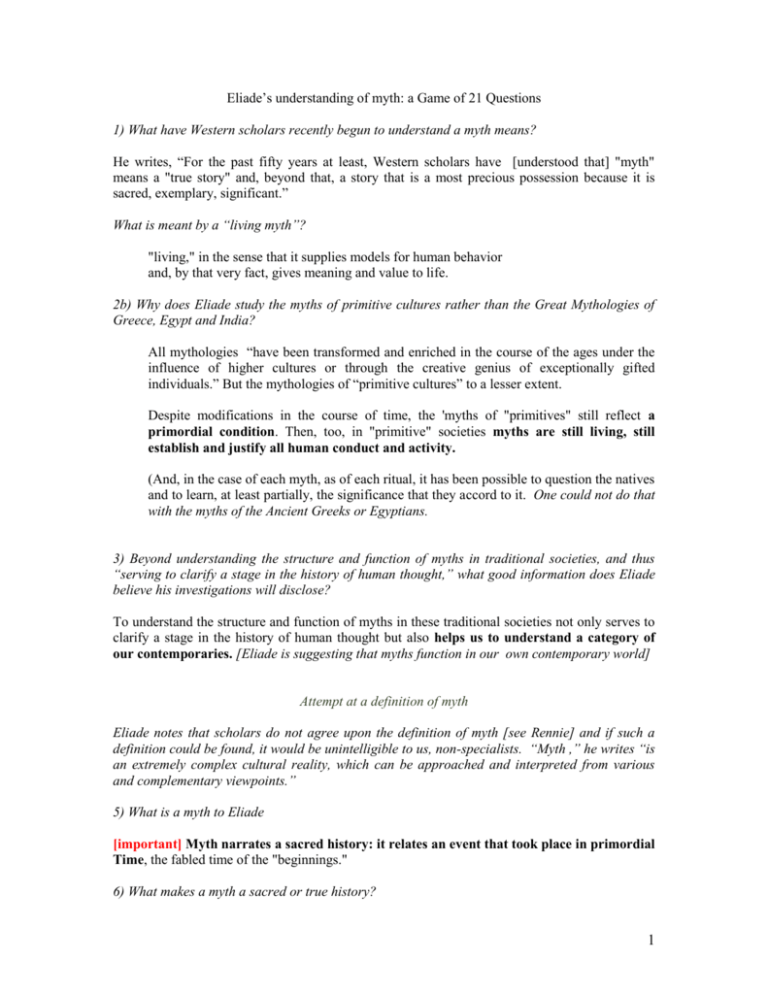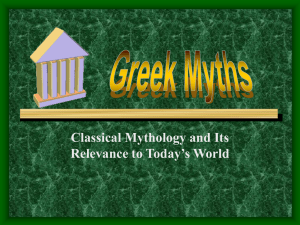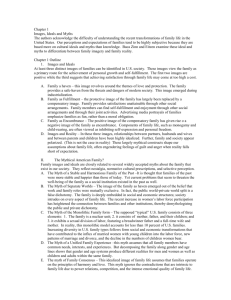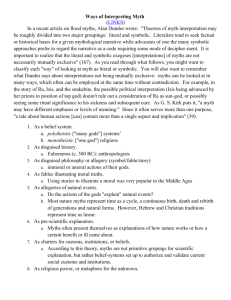For the past fifty years at least, Western scholars have [understood
advertisement

Eliade’s understanding of myth: a Game of 21 Questions 1) What have Western scholars recently begun to understand a myth means? He writes, “For the past fifty years at least, Western scholars have [understood that] "myth" means a "true story" and, beyond that, a story that is a most precious possession because it is sacred, exemplary, significant.” What is meant by a “living myth”? "living," in the sense that it supplies models for human behavior and, by that very fact, gives meaning and value to life. 2b) Why does Eliade study the myths of primitive cultures rather than the Great Mythologies of Greece, Egypt and India? All mythologies “have been transformed and enriched in the course of the ages under the influence of higher cultures or through the creative genius of exceptionally gifted individuals.” But the mythologies of “primitive cultures” to a lesser extent. Despite modifications in the course of time, the 'myths of "primitives" still reflect a primordial condition. Then, too, in "primitive" societies myths are still living, still establish and justify all human conduct and activity. (And, in the case of each myth, as of each ritual, it has been possible to question the natives and to learn, at least partially, the significance that they accord to it. One could not do that with the myths of the Ancient Greeks or Egyptians. 3) Beyond understanding the structure and function of myths in traditional societies, and thus “serving to clarify a stage in the history of human thought,” what good information does Eliade believe his investigations will disclose? To understand the structure and function of myths in these traditional societies not only serves to clarify a stage in the history of human thought but also helps us to understand a category of our contemporaries. [Eliade is suggesting that myths function in our own contemporary world] Attempt at a definition of myth Eliade notes that scholars do not agree upon the definition of myth [see Rennie] and if such a definition could be found, it would be unintelligible to us, non-specialists. “Myth ,” he writes “is an extremely complex cultural reality, which can be approached and interpreted from various and complementary viewpoints.” 5) What is a myth to Eliade [important] Myth narrates a sacred history: it relates an event that took place in primordial Time, the fabled time of the "beginnings." 6) What makes a myth a sacred or true history? 1 Myth is a "true history," because it always deals with realities. myth tells how, through the deeds of Supernatural Beings, a reality came into existence, 7a) What is myth an account of? [important] Myth, then, is always an account of a "creation"; it relates how something was produced, began to be. Myth tells only of that which really happened, which manifested itself completely. The actors in myths are Supernatural Beings. They are known primarily by what they did in the transcendent times of the "beginnings." hence myths disclose their creative activity and reveal the sacredness (or simply the "supernaturalness") of their works. 7b) What do myths describe? . . myths describe the various and sometimes dramatic breakthroughs of the sacred (or the "supernatural") into the World. It is this sudden breakthrough of the sacred that really establishes the World and makes it what it is today. Furthermore, it is as a result of the intervention of Supernatural Beings that man himself is what he is today, a mortal, sexed, and cultural being. 8) What is myth the model for? [Important] Because myth relates the gesta of supernatural Beings and the manifestation of their sacred powers, it becomes the exemplary model for all significant human activities. …. 9) What is the foremost function of myth? [Important] The foremost function of myth is to reveal the exemplary models for all human rites and all significant human activities—diet or marriage, work or education, art or wisdom. This idea is of no little importance for understanding the man of archaic and traditional societies; and we shall return to it later. 10) What do myths narrate? [Important] Myths, that is, narrate not only the origin of the World, of animals, of plants, and of man, but also all the primordial events in consequence of which man became what he is today—mortal, sexed, organized in a society, obliged to work in order to live, and working in accordance with certain rules. If the World exists, it is because supernatural Beings exercised creative powers in the "beginning." But after the cosmogony and the creation of man other events occurred, and man as he is today is the direct result of those mythical events, he is constituted by those events. He is mortal because something happened in illo tempore. If that thing had not happened, man would not be mortal—he would have gone on existing indefinitely, like rocks; or he might have changed his skin periodically like snakes, and hence would have been able to renew his life, that is, begin it over again indefinitely. But the myth of the origin of death narrates what happened in illo tempore, and, in telling the incident, explains why man is mortal. 11) For “archaic” humanity, why are myths a matter of primary importance? For archaic man, myth is a matter of primary importance, while tales and fables are not. Myth teaches him the primordial "stories" that have constituted him existentially; and everything connected with his existence and his legitimate mode of existence in the Cosmos concerns him 2 directly. 12) What are the differences between true stories and false stories? 13) Is there a formal difference? Can we say about a true story that it has a distinct set of conventions, functions or elements, or that it occurs in a particular location, the way we can say about a fairy tale or adventure story of domestic fiction? A “true story” in one tribe can become a “false story” in a neighboring tribe. Thus the form or genre of the story does not by itself make it a myth; the attitude of the listener, the social framework in which the story is told, has that power. [If we were to read Beauty and the Beast as a myth, we would look for an explanation of how death came into the world, or of why humans are the way they are. Similarly, a mythic reading of Cupid and Psyche would explain why humans marry, or why a certain ceremony or ritual is.] 14) What do myths provide archaic humanity? It is essential not only because the myths provide him with an explanation of the World and his own mode of being in the World, 15) How did archaic humanity believe it could repeat the events that occurred Ab origine? For the man of the archaic societies . .. what happened Ab origine can be repeated by the power of rites. For him, then, the essential thing is to know the myths. It is essential not only because the myths provide him with an explanation of the World and his own mode of being in the World, but above all because, by recollecting the myths, by re-enacting them, he is able to repeat what the gods, the Heroes, or the Ancestors did ab origine. To know the myths is to learn the secret of the origin of things. In other words, one learns not only how things came into existence but also where to find them and how to make them reappear when they disappear. Australian totemic myths usually consist in a rather monotonous narrative of peregrinations by mythical ancestors or totemic animals. They tell how, in the "Dream Time" (alcheringa)—that is, in mythical time—these Supernatural Beings made their appearance on earth and set out on long journeys, stopping now and again to change the landscape or to produce certain animals and plants, and finally vanished underground. but knowledge of these myths is essential for the life of the Australians. The myths teach them how to repeat the creative acts of the Supernatural Beings, and hence how to ensure the multiplication of such-and-such an animal or plant. … 16) Being able to make things reappear that went out of existence gave primitive humanity a certain “magico-religious” power. What relationship does Eliade posit between the person who knows the origin of “an object, animal, plant,” and the object, itself? We see, then, that the "story" narrated by the myth constitutes a "knowledge" which is esoteric, not only because it is secret and is handed on during the course of an initiation but also because the "knowledge" is accompanied by a magico-religious power. For knowing the origin of an object, an animal, a plant, and so on is equivalent to acquiring a magical power over them by which they can be controlled, multiplied, or reproduced at will. 3 Erland Nordenskiöld has reported some particularly suggestive examples from the Cuna Indians. According to their beliefs, the lucky hunter is the one who knows the origin of the game. And if certain animals can be tamed, it is because the magicians know the secret of their creation. [I might to be provocative draw a parallel with art, such as music or storytelling: to know the tones, rhythm, color and so forth, or to know the story compels certain responses in the listeners and readers. Perhaps the same parallel can be drawn between “the lucky hunter” and the reader, who, in attempting to understand a story, re-tells it to himself or herself. The reward is a certain knowledge and understanding, of the story, of himself/herself and of the world.] 17) In order to control something, is it enough to “know the origin myth”? In most cases it is not enough to know the origin myth, one must recite it; this, in a sense, is a proclamation of one’s knowledge, displays it. 18) What happens to the person who “recites or performs” the origin myth? But this is not all. He who recites or performs the origin myth is thereby steeped in the sacred atmosphere in which these miraculous events took place. The mythical time of origins is a "strong" time because it was transfigured by the active, creative presence of the Supernatural Beings. By reciting the myths one reconstitutes that fabulous time and hence in some sort becomes "contemporary" with the events described, one is in the presence of the gods or Heroes. As a summary formula we might say that by "living" the myths one emerges from profane, chronological time and enters a time that is of a different quality, a "sacred" Time at once primordial and indefinitely recoverable. This function of myth, which we have emphasized in our Myth of the Eternal Return (especially pp. 35 ff.), will appear more clearly in the course of the following analyses. Structure and function of myths (Summary) (1) (2) (3) (4) (5) constitutes the History of the acts of the Supernaturals; that this History is considered to be absolutely true (because it is concerned with realities) and sacred (because it is the work of the Supernaturals); that myth is always related to a "creation," it tells how something came into existence, or how a pattern of behavior, an institution, a manner of working were established; this is why myths constitute the paradigms for all significant human acts; that by knowing the myth one knows the "origin" of things and hence can control and manipulate them at will; this is not an "external," "abstract" knowledge but a knowledge that one "experiences" ritually, either by ceremonially recounting the myth or by performing the ritual for which it is the justification; that in one way or another one "lives" the myth, in the sense that one is seized by the sacred, exalting power of the events recollected or re-enacted. (19) What does “living” a myth imply? "Living" a myth, then, implies a genuinely "religious" experience, since it differs from the ordinary experience of everyday life. The "religiousness" of this experience is due to the fact that 4 one re-enacts fabulous, exalting, significant events, one again witnesses the creative deeds of the Supernaturals; (20) How does “living” a myth alter time, or one’s perception of time? . . . one ceases to exist in the everyday world and enters a transfigured, auroral world impregnated with the Supernaturals’ presence. What is involved is not a commemoration of mythical events but a reiteration of them. The protagonists of the myth are made present; one becomes their contemporary. This also implies that one is no longer living in chronological time, but in the primordial Time, the Time when the event first took place. This is why we can use the term the "strong time" of myth; it is the prodigious, "sacred" time when something new, strong, and significant was manifested. (21) What is the desire that is universally present in “al the ritual reiterations of myth”? To re-experience that time, to re-enact it as often as possible, to witness again the spectacle of the divine works, to meet with the Supernaturals and relearn their creative lesson is the desire that runs like a pattern through all the ritual reiterations of myths. In short, myths reveal that the World, man, and life have a supernatural origin and history, and that this history is significant, precious, and exemplary. -------- The following has been excerpted from Mircea Eliade, Myth and Reality. Trans. Willard R. Trask. New York: Harper & Row, 1963. 5







